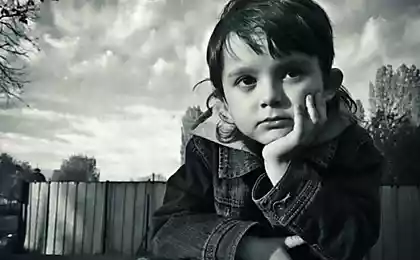527
An internal set of skills necessary for parents
The voice of the critic in our head never stop their notations, and to raise children becomes more difficult than could be.
Despite the abundance of books on my bookshelf that had accumulated since finishing graduate school, about parenting I learned mostly from my own parental experience and from other parents, as it happens in all of us.
I am a clinical psychologist and the last 20 years I mainly specializies in the treatment of children and also give advice to their parents. I have a good education, license, experience, and hundreds of books read over the shoulders. Since I myself am a parent, I can honestly answer "the" question that I sometimes ask at the consultations concerned parents – about my understanding of what they're going through, both professionally and personally. So, yeah, I know how to raise children and as a professional, to some extent, myself as a parent.

Parents need a new way of passing through inevitable suffering and the total for all the emotional pain associated with raising children.
Trying to understand all the subtleties of parenthood at work and at home, I have learned one thing: the emotional pain of modern education is universal. All parents sooner or later are faced with the strong spikes of negative feelings and, unfortunately, many bogged down in pointless suffering as a result of what is happening inside of them – their reactions to these painful emotions. This truth led me to the following conclusion: parents need to learn new ways to relate to suffering is inevitable and common to all emotional pain associated with parenthood.
To do this, there is an inherent set of skills – knowing what is happening, what is changing, and that will mean moving forward. For many parents it is too elusive and could be a large part of the pain, as shown by a grim sociological study, revealing high levels of anxiety, stress and depression among parents.
Sitting at your Desk in moments of reflection, and sometimes watching my infant son spill water all over the bathroom, I track a variety of parental emotions, that shiver which shakes the skills of civilization and throws it in the sea of emotional experiences.
For all modern parents is characterized by such emotional experiences, such as:
What parents need is help in the course of a stage, rather than struggle with him, with pain, disappointment, and doubt. Leave all the justification and reasoning of sociological, political or even religious debate, because here we focusareas on the other. We don't just want to make parenthood bearable and tolerable – we are interested in the smallest details of how to find the way to the vast possibilities of experience – in all its splendor and shrillness.
What parents need – so it's help in the course of pain, disappointment and doubt, instead of fighting with them.
I'm not talking here about the intricacies of raising children – there are many books, entire stands in bookstores, which contain helpful tips, something like "7 steps to effective parenting", making that you will become a super-mega-parent if you will use all of these tips consistently and regularly.
Quite possibly, they are really valuable and good. Nevertheless, nam still going to have to stop and meet face to face with yourself as a parent. What I address is the relationship with yourself, the pain that we so easily magnify inept means unnecessary suffering.
I don't know of any way or tool that would help to stop the inevitable pain of parenting. Assume that such a tool simply does not exist. Bright flashes of sweet moments – when our child made the first step or learned to swing on the swings ultimately subside. When little children disappear from our sight, we tense up with excitement.
Many years will pass and they will throw sharp looks-phrase daggers and hammers, but even now when they are still little growth, we can't make our emotional buttons was out of their reach. You become a parent, and now you can forget about a peaceful sleep, from now on it will always be interrupted when your child is still young and crying in her crib at night, or when he has grown up and you worry when he finally comes home.
There are an infinite number of causes that will be an obstacle to easy happiness we want for their children. And nobody will give you a hint what to do at that pivotal moment when they will crash at the door, waiting for our saving of the parent words. All other priorities in life – our work, relationships, our own extended family — will put pressure on us just because they want more. And you can lose more than their fair share in this life.
I don't know of any way or tool that would help to stop the inevitable pain of parenting.
Assume that such a tool simply does not exist.
In this article, as well as in planning subsequent articles, I invite you to discover their parental minds – don't just look at ourselves and actually meet with his inner voice and recognize it (in the harder moments of parenting, this voice is often heard as the voice of the judge, jury, and executioner).
I suggest you to withstand long hard look at this. "You're not good enough," he says. "You can't handle these kids... there is trouble...", "...they are ungrateful, you will never have your life..."
That voice in your head will never stop their notations, and to raise children becomes more difficult than could be. In complicated family situations, instead of divorce from your spouse, it would be wiser to think about the divorce with this voice in my head.
I want you staying with her pain, saw his consciousness as puppy, beginner workout. Focusing on the practice of mindfulness, you can train your brain to stay seated and contemplate the patterns on the carpet of your mental and emotional experience, giving myself the time that the pain started to change myself.
I'll try to give you a boost that will help you to train your brain parent. You can allow pain to be what it is, not blaming themselves and not turning it into a beast that most of us sometimes find yourself in difficult moments of parenthood. The pain – and – suffering- no.
When physical or emotional pain increases, it is useful to have gained the ability to consciously notice her, allowing her to just be, to observe how it changes and usually dissolves by itself. After all, when you press on the sore spot, put pressure on him, trying to make pain go away, it often goes in circles and turns into suffering – the eternal sworn companion of our mind.
So it can be a very useful learning how to abide in the experience of pain, not adding to it anguish, or plans to solve their problems. This is a term from the practice of mindfulness – "acceptance". And by this term I do not mean the sense of surrender and defeat pain, which are inevitable when raising children. On the contrary, it is an active right to choose, which gives you the opportunity to relax and let the pain pass through you.
Pause for practice.
You can use the technique of N. A. P. P, for pain that manifests in your everyday life as a parent. Here is the steps of this technique:
Do these steps-making practices, try them next time you meet difficulties in communicating with your children. I would advise to start with more simple situations – try the first "fruits that are hanging low" in range for your skills of mindfulness and awareness. With practice, over time you will be able to make this technique even more severe conditions – to more complex or troubling situations.
See also: deafness Emotional environment
How to make a growing up son
Be patient with yourself. Let me remind you that "the pain of parenthood" is universal. None of us is immune from it, and together we walk this path to higher consciousness in relationships with our children. That's why it's called practice, not perfection.published
Mitch Abblett, translation Elena Pakulin
P. S. And remember, only by changing their consumption — together we change the world! ©
Source: www.go2mindfulness.com/kb/parenting/when-parenting-gets-tough/
Despite the abundance of books on my bookshelf that had accumulated since finishing graduate school, about parenting I learned mostly from my own parental experience and from other parents, as it happens in all of us.
I am a clinical psychologist and the last 20 years I mainly specializies in the treatment of children and also give advice to their parents. I have a good education, license, experience, and hundreds of books read over the shoulders. Since I myself am a parent, I can honestly answer "the" question that I sometimes ask at the consultations concerned parents – about my understanding of what they're going through, both professionally and personally. So, yeah, I know how to raise children and as a professional, to some extent, myself as a parent.

Parents need a new way of passing through inevitable suffering and the total for all the emotional pain associated with raising children.
Trying to understand all the subtleties of parenthood at work and at home, I have learned one thing: the emotional pain of modern education is universal. All parents sooner or later are faced with the strong spikes of negative feelings and, unfortunately, many bogged down in pointless suffering as a result of what is happening inside of them – their reactions to these painful emotions. This truth led me to the following conclusion: parents need to learn new ways to relate to suffering is inevitable and common to all emotional pain associated with parenthood.
To do this, there is an inherent set of skills – knowing what is happening, what is changing, and that will mean moving forward. For many parents it is too elusive and could be a large part of the pain, as shown by a grim sociological study, revealing high levels of anxiety, stress and depression among parents.
Sitting at your Desk in moments of reflection, and sometimes watching my infant son spill water all over the bathroom, I track a variety of parental emotions, that shiver which shakes the skills of civilization and throws it in the sea of emotional experiences.
For all modern parents is characterized by such emotional experiences, such as:
- Fear for the children (they will hurt, they will not be loved, or somehow they will have an unhappy fate or betray their friends)
- Disappointment and sadness (when we, clenching his teeth, seeing the crumbling of our plans and everything we have ever wanted, is drowning in the waves of unforeseen circumstances)
- Shock (when the skills that we possessed in the past, or the resources that we have at the moment, can not withstand the requirements of the child – small or grown up already)
- A sense of loss (when we see how short sweet moments yield to the inevitability of change and requirements that are different from our own needs when we get upset with failures and dashed hopes of our children)
- Guilt (due to the infinite examples of how we lack communication skills with children, how we get trapped, when I want to stand in front of them dutiful parents, and, consciously or not, hurting their children)
- Confusion (when the situation puts us into a dead end, and we don't understand which of the available parent tools we could use; when all the known rules and regulations " how to be an authority on the family," crumble to dust when confronted with life)
- Fear for themselves (when not satisfied our needs, impedes career growth, deteriorating relationships, increases dependence, and we realize that in the future will be on the sidelines, losing to the next generation)
What parents need is help in the course of a stage, rather than struggle with him, with pain, disappointment, and doubt. Leave all the justification and reasoning of sociological, political or even religious debate, because here we focusareas on the other. We don't just want to make parenthood bearable and tolerable – we are interested in the smallest details of how to find the way to the vast possibilities of experience – in all its splendor and shrillness.
What parents need – so it's help in the course of pain, disappointment and doubt, instead of fighting with them.
I'm not talking here about the intricacies of raising children – there are many books, entire stands in bookstores, which contain helpful tips, something like "7 steps to effective parenting", making that you will become a super-mega-parent if you will use all of these tips consistently and regularly.
Quite possibly, they are really valuable and good. Nevertheless, nam still going to have to stop and meet face to face with yourself as a parent. What I address is the relationship with yourself, the pain that we so easily magnify inept means unnecessary suffering.
I don't know of any way or tool that would help to stop the inevitable pain of parenting. Assume that such a tool simply does not exist. Bright flashes of sweet moments – when our child made the first step or learned to swing on the swings ultimately subside. When little children disappear from our sight, we tense up with excitement.
Many years will pass and they will throw sharp looks-phrase daggers and hammers, but even now when they are still little growth, we can't make our emotional buttons was out of their reach. You become a parent, and now you can forget about a peaceful sleep, from now on it will always be interrupted when your child is still young and crying in her crib at night, or when he has grown up and you worry when he finally comes home.
There are an infinite number of causes that will be an obstacle to easy happiness we want for their children. And nobody will give you a hint what to do at that pivotal moment when they will crash at the door, waiting for our saving of the parent words. All other priorities in life – our work, relationships, our own extended family — will put pressure on us just because they want more. And you can lose more than their fair share in this life.
I don't know of any way or tool that would help to stop the inevitable pain of parenting.
Assume that such a tool simply does not exist.
In this article, as well as in planning subsequent articles, I invite you to discover their parental minds – don't just look at ourselves and actually meet with his inner voice and recognize it (in the harder moments of parenting, this voice is often heard as the voice of the judge, jury, and executioner).
I suggest you to withstand long hard look at this. "You're not good enough," he says. "You can't handle these kids... there is trouble...", "...they are ungrateful, you will never have your life..."
That voice in your head will never stop their notations, and to raise children becomes more difficult than could be. In complicated family situations, instead of divorce from your spouse, it would be wiser to think about the divorce with this voice in my head.
I want you staying with her pain, saw his consciousness as puppy, beginner workout. Focusing on the practice of mindfulness, you can train your brain to stay seated and contemplate the patterns on the carpet of your mental and emotional experience, giving myself the time that the pain started to change myself.
I'll try to give you a boost that will help you to train your brain parent. You can allow pain to be what it is, not blaming themselves and not turning it into a beast that most of us sometimes find yourself in difficult moments of parenthood. The pain – and – suffering- no.
When physical or emotional pain increases, it is useful to have gained the ability to consciously notice her, allowing her to just be, to observe how it changes and usually dissolves by itself. After all, when you press on the sore spot, put pressure on him, trying to make pain go away, it often goes in circles and turns into suffering – the eternal sworn companion of our mind.
So it can be a very useful learning how to abide in the experience of pain, not adding to it anguish, or plans to solve their problems. This is a term from the practice of mindfulness – "acceptance". And by this term I do not mean the sense of surrender and defeat pain, which are inevitable when raising children. On the contrary, it is an active right to choose, which gives you the opportunity to relax and let the pain pass through you.
Pause for practice.
You can use the technique of N. A. P. P, for pain that manifests in your everyday life as a parent. Here is the steps of this technique:
- Notice – please note and observe the painful sensations in your body, as well as any accompanying thoughts as they occur
- Allow – allow everything to be as it is without trying to change anything
- Prostrate – give in, this should just "lie down" and "calm down" in the present moment, until the pain
- Passes – will pass through you and leave
Do these steps-making practices, try them next time you meet difficulties in communicating with your children. I would advise to start with more simple situations – try the first "fruits that are hanging low" in range for your skills of mindfulness and awareness. With practice, over time you will be able to make this technique even more severe conditions – to more complex or troubling situations.
See also: deafness Emotional environment
How to make a growing up son
Be patient with yourself. Let me remind you that "the pain of parenthood" is universal. None of us is immune from it, and together we walk this path to higher consciousness in relationships with our children. That's why it's called practice, not perfection.published
Mitch Abblett, translation Elena Pakulin
P. S. And remember, only by changing their consumption — together we change the world! ©
Source: www.go2mindfulness.com/kb/parenting/when-parenting-gets-tough/
Tea from celery will help you lose weight. Write down the recipe!
PAROC completes the construction of energy-efficient home in the Tver region
























